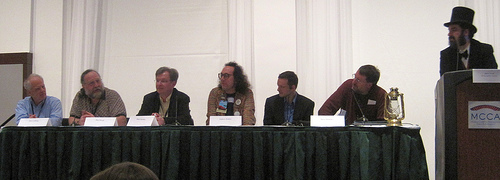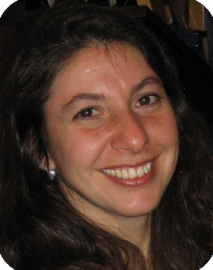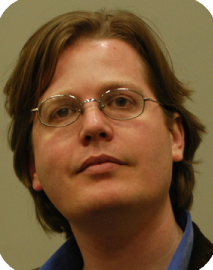I’m delighted to announce our Spring 2010 Purple Blurb events:
Video
Roderick Coover & Nitin Sawhney
Monday, March 1
5:30pm-7pm
Poetry
Stephanie Strickland
Monday, March 8
5:30pm-7pm
Interactive Fiction
Jeremy Freese & Emily Short
Monday, March 29
5:30pm-7pm
Poetry
John Cayley & Daniel C. Howe
Wednesday, April 28
7:30pm-9pm
All events are in MIT’s 14E-310.
Note that the first three events begin earlier (5:30pm) than in semesters past, while the final event this semester begins later (7:30pm).
Please also note (or recall) that 14E is the east wing of Building 14, the building which also houses the Hayden Library. This is *not* building E14, the new Media Lab building.
March 1
RODERICK COOVER
Canyonlands (www.unknownterritories.org) is a film and interactive documentary about the works of the novelist and essayist, Edward Abbey (1927-1989). Abbey worked as a seasonal ranger and forest lookout in Western parks and forest-lands, wrote in praise of wilderness, and called attention to the destruction of the desert landscape. His descriptions of eco-sabotage in his novel The Monkey Gang were an inspiration for the formation of the environmentalist organizations such as EarthFirst! Canyonlands takes users into a virtual representation of the Colorado River and Utah canyonlands. There, users will follow Abbey’s road and fascinating side routes as they weave their way through history.
Roderick Coover makes panoramic interactive environments, collaborative streaming visual poems, and multimedia documentary projects about histories, narratives, and the sense of place. Some titles include Unknown Territories (Unknownterritories.org), Cultures in Webs (Eastgate Systems), From Verite to Virtual (D.E.R), The Theory of Time Here (Video Data Bank), The Language of Wine (RLCP), and Something That Happened Only Once (RLCP) among others. An associate professor of film and media arts at Temple University, Roderick Coover has received awards from USIS-Fulbight, a LEF Foundation, and the Mellon Foundation, among others. URL: http://www.roderickcoover.com
NITIN SAWHNEY
Strawberries, Roosters and the Chocolate Seas is an upcoming feature-length documentary. It is a personal journey into the heart of Gaza using a satirical and poetic rendering of everyday life and the extraordinary events witnessed by the filmmaker, during his visit there one year after the devastating 22-day siege in January 2009. The film, shot during two intense weeks in January 2010, includes interviews with fishermen, farmers, physicians, teachers, and working professionals, interspersed with footage that captures dramatic events like the large convoys of aid arriving in Gaza despite the blockade, tunnels used to smuggle goods, hip hop bands striving for creative expression, and the floods that turned Gaza’s seashore from deep blue to chocolate.
Nitin Sawhney is a research fellow in the Program in Art, Culture and Technology in the Department of Architecture at MIT. He co-founded the Voices Beyond Walls initiative for digital storytelling in Palestinian refugee camps. The program was founded in 2006, when pilot digital media and storytelling workshops were first conducted in the Balata and Jenin refugee camps in the West Bank. Since then local and international volunteers have conducted nearly a dozen workshops in six different refugee camps. See: http://www.voicesbeyondwalls.org Sawhney was selected as a Visionary Fellow with the Jerusalem 2050 Program: http://envisioningpeace.org/visions/media-barrios He has recently returned from a trip to Gaza and is sharing footage from a documentary he is co-producing: http://www.GazaRoosterFilms.com
March 8
STEPHANIE STRICKLAND
Strickland will read from four collaborative digital poems created over the past twelve years, each of which uses the screen differently: V: Vniverse, Ballad of Sand and Harry Soot, Errand Upon Which We Came, and slippingglimpse.
Stephanie Strickland is a print and hypermedia poet who, in addition to having written the digital poems mentioned above, has published five books: Zone : Zero, V: WaveSon.nets / Losing L’una, True North, The Red Virgin: A Poem Of Simone Weil, and Give the Body Back.
March 29
JEREMY FREESE
Violet is an interactive short story about romance and procrastination in which the main character is struggling to complete his dissertation. The things that happen in the simulated graduate student office are narrated to the player by the (imaginary) voice of the main character’s Australian girlfriend. Violet won several XYZZY awards in 2008, including the award for Best Game, and was the winner of the 2008 Interactive Fiction Competition.
Jeremy Freese is a professor in the Department of Sociology, School of Communication, and Institute for Policy Research at Northwestern University.
EMILY SHORT
Alabaster is a fractured fairy tale by John Cater, Rob Dubbin, Eric Eve, Elizabeth Heller, Jayzee, Kazuki Mishima, Sarah Morayati, Mark Musante, Emily Short, Adam Thornton, and Ziv Wities, illustrated by Daniel Allington-Krzysztofiak. This interactive fiction is an experiment in open authorship. The introduction to the story was written and released by Short in 2008. The game is implemented in Inform 7 using a conversation system, developed by Short, that will be released for general use by Inform 7 developers. There are eighteen possible endings to Alabaster.
Emily Short is author of or collaborator on more than two dozen interactive fictions, including Galatea (winner of Best of Show in the 2000 IF Art Show) and Savoir Faire (XYZZY Award for Best Game and in other categories, 2002) and Floatpoint (winner of the 2006 IF Competition) along with other XYZZY award-winning games: Metamorphoses (2000), Pytho’s Mask (2001), City of Secrets (2003), and Mystery House Possessed (2005). Short, who is a classicist and a scholar of attic drama, has worked on the development of Inform 7, has reviewed dozens of games, and writes the column “Homer in Silicon” for GameSetWatch.
April 28
The Readers Project is a collection of distributed, performative, quasi-autonomous poetic ‘Readers’ — active, procedural entities with distinct reading behaviors and strategies. We release these Readers onto inscribed surfaces that may be explicitly or implicitly, visibly or invisibly, constituted by their texts. Over time, the Readers will address themselves to a wide range of material — from conventional found texts, through poetic reconfigurations of appropriated (fairly-used) sources, to original compositions by the project’s collaborators, and so on.
Designed to support the creation of novel works of digital literature, Howe’s RiTa library, in which The Readers Project is implemented, provides a unique set of tools for artists and writers working in programmable media. Combining features of natural language processing, computational stylistics, and generative systems, RiTa enables a range of tasks, from statistical methods, to grammar-based generation, to linguistic database access (e.g., WordNet), to text-mining, to text-to-speech, to image, audio, & animation, all in real-time. RiTa is free and open-source and integrates with the popular Processing environment for digital arts programming.
JOHN CAYLEY
John Cayley writes digital media, particularly in the domain of poetry and poetics. Recent and ongoing projects include The Readers Project with Daniel Howe, imposition with Giles Perring, riverIsland, and what we will. Information on these and other works may be consulted at http://programmatology.shadoof.net. Cayley is a visiting professor at Brown University, Literary Arts Program.
DANIEL C. HOWE
Daniel C. Howe is a digital artist and researcher whose work explores the intersections of literature, computation, and procedural art practice. He recently received his PhD (on generative literary systems) from the Media Research Lab at NYU and was awarded a ‘Computing Innovations’ fellowship from the National Science Foundation for 2010. He currently resides in Providence, RI where he teaches at Brown and RISD, and is a resident artist at AS220. His site: http://mrl.nyu.edu/~dhowe/








